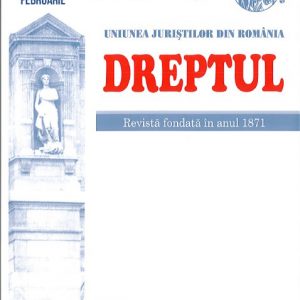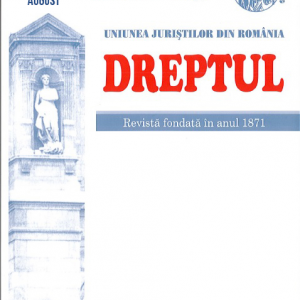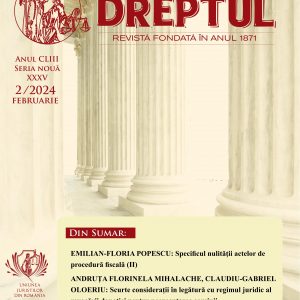-
 Asociația Internațională de Filosofie a Dreptului și Filosofie Socială (I.V.R.)1 a fost înființată în anul 1909 la Berlin, ca „Asociația Internațională pentru Filosofia Dreptului și Filosofie economică” și redenumită apoi, în 1933, „Asociația Internațională pentru Filosofia Dreptului și Filosofie socială”. I.V.R este cea mai veche, cea mai mare și importantă organizație în domeniul filosofiei dreptului și filosofiei sociale. Reorganizarea I.V.R. pe secțiuni naționale a fost decisă la Viena în 1959. Astăzi, I.V.R. are mai mult de 40 de asociații naționale membre (între care și asociația națională română), cu peste 2000 de membri în întreaga lume. Asociația este înregistrată, în temeiul legislației germane, și are sediul în Wiesbaden. Scopul său principal este de a sprijini și de a promova filosofia juridică și socială la nivel național și internațional. I.V.R. organizează congrese mondiale, la fiecare doi ani. Publicația oficială a I.V.R. este o revistă internațională, Archiv für Rechts-und Sozialphilosophie.
Asociația Internațională de Filosofie a Dreptului și Filosofie Socială (I.V.R.)1 a fost înființată în anul 1909 la Berlin, ca „Asociația Internațională pentru Filosofia Dreptului și Filosofie economică” și redenumită apoi, în 1933, „Asociația Internațională pentru Filosofia Dreptului și Filosofie socială”. I.V.R este cea mai veche, cea mai mare și importantă organizație în domeniul filosofiei dreptului și filosofiei sociale. Reorganizarea I.V.R. pe secțiuni naționale a fost decisă la Viena în 1959. Astăzi, I.V.R. are mai mult de 40 de asociații naționale membre (între care și asociația națională română), cu peste 2000 de membri în întreaga lume. Asociația este înregistrată, în temeiul legislației germane, și are sediul în Wiesbaden. Scopul său principal este de a sprijini și de a promova filosofia juridică și socială la nivel național și internațional. I.V.R. organizează congrese mondiale, la fiecare doi ani. Publicația oficială a I.V.R. este o revistă internațională, Archiv für Rechts-und Sozialphilosophie. -

-
 Although the legal doctrine has been less concerned with this subject matter, there are some papers elaborated under the influence of the previous regulations, however, there are quite a few recent papers. In this article, the author makes an analysis of the offences of this special regulation, preferring a classical approach of the subject, the structure being as follows: 1) a brief history of regulations in the field of fishing and aquaculture; 2) the analysis of the offences in terms of constitutive elements, but having in view that some elements are common to all offences, such as, for example, the legal object; these are analyzed by groups, in order to avoid repetition; 3) a few elements of comparative law, by exemplification of some incriminations in the specific legislation of other States.
Although the legal doctrine has been less concerned with this subject matter, there are some papers elaborated under the influence of the previous regulations, however, there are quite a few recent papers. In this article, the author makes an analysis of the offences of this special regulation, preferring a classical approach of the subject, the structure being as follows: 1) a brief history of regulations in the field of fishing and aquaculture; 2) the analysis of the offences in terms of constitutive elements, but having in view that some elements are common to all offences, such as, for example, the legal object; these are analyzed by groups, in order to avoid repetition; 3) a few elements of comparative law, by exemplification of some incriminations in the specific legislation of other States. -
 Within this article, the author makes an analysis of the main provisions of the Hague Convention of 1985 on the law applicable to trusts and on their recognition. In the context of introducing in the Romanian civil law the legal operation of fiducia, achieved by the provisions of Articles 773–791 of the Civil Code of 2009, Romania’s accession to the Hague Convention would be a natural step that the Romanian legislator should take in the near future. Although some of the provisions of the Hague Convention have been taken, tale quale, within the provisions of private international law relating to the fiducia, the accession to the Hague Convention and its introduction into the Romanian internal law, would lead to expanding the scope of practical application of the legal instrument of the fiducia itself.
Within this article, the author makes an analysis of the main provisions of the Hague Convention of 1985 on the law applicable to trusts and on their recognition. In the context of introducing in the Romanian civil law the legal operation of fiducia, achieved by the provisions of Articles 773–791 of the Civil Code of 2009, Romania’s accession to the Hague Convention would be a natural step that the Romanian legislator should take in the near future. Although some of the provisions of the Hague Convention have been taken, tale quale, within the provisions of private international law relating to the fiducia, the accession to the Hague Convention and its introduction into the Romanian internal law, would lead to expanding the scope of practical application of the legal instrument of the fiducia itself. -
 This paper aims to address some issues encountered in the control/audit activity that the Romanian Court of Accounts performs on public authorities and institutions, which aims the disputes arising from breaching by them of the provisions of Law no. 544/2001 on free access to public information. The law provides, in art. 22, that the person who considers himself injured in his rights may appeal to the legal administrative department in whose territorial jurisdiction is residing or the authority or public institution is situated, and the court may require the defendant authority to provide the requested information and pay moral and/or property damages. The defendant in this litigation is the territorial administrative unit (village, town, city, county), and the obligation to pay any compensation falls to it.
This paper aims to address some issues encountered in the control/audit activity that the Romanian Court of Accounts performs on public authorities and institutions, which aims the disputes arising from breaching by them of the provisions of Law no. 544/2001 on free access to public information. The law provides, in art. 22, that the person who considers himself injured in his rights may appeal to the legal administrative department in whose territorial jurisdiction is residing or the authority or public institution is situated, and the court may require the defendant authority to provide the requested information and pay moral and/or property damages. The defendant in this litigation is the territorial administrative unit (village, town, city, county), and the obligation to pay any compensation falls to it. -
 Based on provisions of art. 20 of the Romanian Constitution, republished, and considering the provisions of art. 5 para. 4 of the Convention on Human Rights and Fundamental Freedoms, the principle of equality of arms and related jurisprudence of the European Court of Human Rights (ECHR), the authors argue that both de lege lata, and in terms of the new Criminal Procedure Code, the detainee is in a position of net disadvantage to the prosecution represented by the prosecutor, since the defendant to whom, on the merits, the request for revocation of preventive detention or its replacement was rejected, it is not given the opportunity to effective remedy. Consequently, the authors make some suggestions de lege ferenda in order to regulate this situation in accordance with the provisions in Constitution and the ECHR jurisprudence.
Based on provisions of art. 20 of the Romanian Constitution, republished, and considering the provisions of art. 5 para. 4 of the Convention on Human Rights and Fundamental Freedoms, the principle of equality of arms and related jurisprudence of the European Court of Human Rights (ECHR), the authors argue that both de lege lata, and in terms of the new Criminal Procedure Code, the detainee is in a position of net disadvantage to the prosecution represented by the prosecutor, since the defendant to whom, on the merits, the request for revocation of preventive detention or its replacement was rejected, it is not given the opportunity to effective remedy. Consequently, the authors make some suggestions de lege ferenda in order to regulate this situation in accordance with the provisions in Constitution and the ECHR jurisprudence. -
 The succession of the criminal codes has created numerous transitory situations requiring a functional system of principles to be solved. In this context, the courts have provided different solutions to some aspects related to the application of the criminal law in time, thus generating a non-unitary practice. The main cause of these contradictions was represented by the modality of determination of the most favourable criminal law. Just when it seemed that the High Court of Cassation and Justice had clarified the misunderstandings, the Constitutional Court has pronounced the Decision No 265/2014 which completely changes the situation, offering an interpretation that does not find many followers among jurists.
The succession of the criminal codes has created numerous transitory situations requiring a functional system of principles to be solved. In this context, the courts have provided different solutions to some aspects related to the application of the criminal law in time, thus generating a non-unitary practice. The main cause of these contradictions was represented by the modality of determination of the most favourable criminal law. Just when it seemed that the High Court of Cassation and Justice had clarified the misunderstandings, the Constitutional Court has pronounced the Decision No 265/2014 which completely changes the situation, offering an interpretation that does not find many followers among jurists. -
 Durata de suspendare a exercitării dreptului de a conduce autovehicule în situația nepredării permisului de conducere începe să curgă de la expirarea perioadei de 15/30 zile și nu de la data rămânerii definitive a hotărârii civile sau de la data înștiințării efectuate de organele de poliție către inculpat în legătură cu această perioadă.
Durata de suspendare a exercitării dreptului de a conduce autovehicule în situația nepredării permisului de conducere începe să curgă de la expirarea perioadei de 15/30 zile și nu de la data rămânerii definitive a hotărârii civile sau de la data înștiințării efectuate de organele de poliție către inculpat în legătură cu această perioadă. -

-
 We mentally associate the first half of the nineteenth century with the affirmation of some ideas and projects of political and administrative reform of the two Romanian principalities connected to the most advanced spirit in Europe of those times. The national common sense watchword was, at that time, the modernization of the principalities in the spirit of the reforms stimulated and encouraged by the French Revolution in the late eighteenth century. Still under the suzerainty of the Ottoman Empire, Moldavia and Walachia were trying to receive European political and legal institutions and to place them into Romanian governance mechanisms, also preparing thereby the formation of a new legal thinking and practice, of a new government mentality, in the spirit of the Western Europe. From this perspective, the author analyzes the origins and the constitutional functions of the Legislative Council, using, for this, some prestigious doctrinal studies published in specialized magazines in the inter-war period of the twentieth century. Likewise, the author analyzes the role of the Legislative Council configured in Article 79 of the Constitution adopted in 1991 and its organic law.
We mentally associate the first half of the nineteenth century with the affirmation of some ideas and projects of political and administrative reform of the two Romanian principalities connected to the most advanced spirit in Europe of those times. The national common sense watchword was, at that time, the modernization of the principalities in the spirit of the reforms stimulated and encouraged by the French Revolution in the late eighteenth century. Still under the suzerainty of the Ottoman Empire, Moldavia and Walachia were trying to receive European political and legal institutions and to place them into Romanian governance mechanisms, also preparing thereby the formation of a new legal thinking and practice, of a new government mentality, in the spirit of the Western Europe. From this perspective, the author analyzes the origins and the constitutional functions of the Legislative Council, using, for this, some prestigious doctrinal studies published in specialized magazines in the inter-war period of the twentieth century. Likewise, the author analyzes the role of the Legislative Council configured in Article 79 of the Constitution adopted in 1991 and its organic law. -
 In this study, the author analyzes the ratio of the „data of a personal nature” and „personal data” and he draws up an inventory of the most important qualifications offered so far by the doctrine about the legal nature of these data. Finally, the author concludes that „personal data” are intangible movable assets, then he presents a number of practical consequences of this qualification.
In this study, the author analyzes the ratio of the „data of a personal nature” and „personal data” and he draws up an inventory of the most important qualifications offered so far by the doctrine about the legal nature of these data. Finally, the author concludes that „personal data” are intangible movable assets, then he presents a number of practical consequences of this qualification. -
 The expertise, object of analysis of the present article, constitutes an evidence whose administration is frequently encountered in the judicial practice in civil matters, being imposed in order to clarify some factual circumstances through the specialized contribution of an expert. Thanks to its high degree of precision in determining the factual circumstances of the litigious situation, the expertise is one of the most edifying evidence administered in a trial, being necessary, as such, a thorough knowledge of its legal regime, but also of the issues that envisage the specialization of the expert appointed to carry out the expertise and set its objectives.
The expertise, object of analysis of the present article, constitutes an evidence whose administration is frequently encountered in the judicial practice in civil matters, being imposed in order to clarify some factual circumstances through the specialized contribution of an expert. Thanks to its high degree of precision in determining the factual circumstances of the litigious situation, the expertise is one of the most edifying evidence administered in a trial, being necessary, as such, a thorough knowledge of its legal regime, but also of the issues that envisage the specialization of the expert appointed to carry out the expertise and set its objectives.
